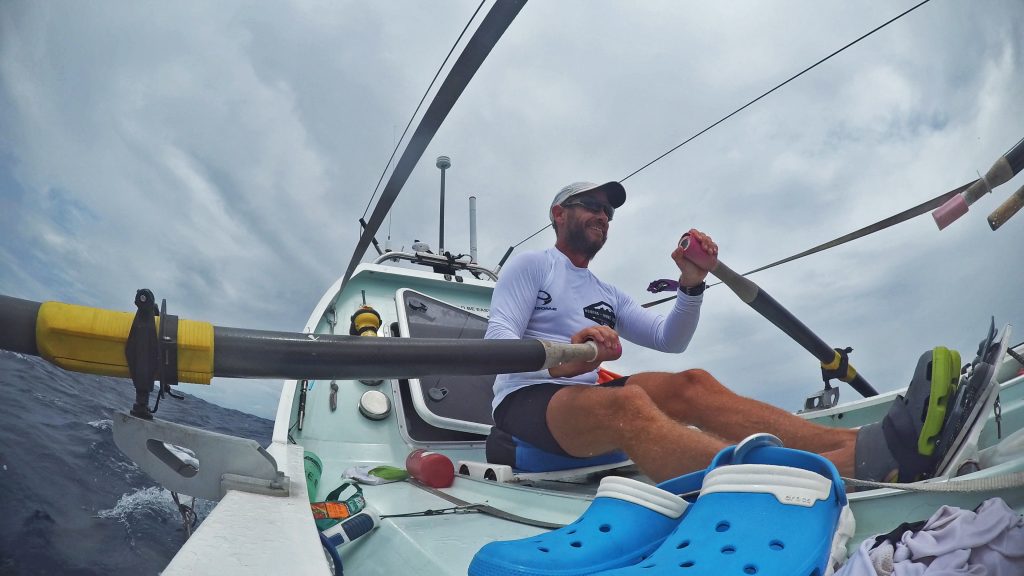
Where’s home in NZ?
A farming community called Stratford in the province of Taranaki in the North Island. I’m coming up to twenty years living in Singapore.
Tell us about Home-To-Home.
I started the journey on 3 January, 2017 and expected to be finished by December 2017. I travelled 10,000km by human power for 147 days to reach the east of Australia. My attempt to row the final stage across the Tasman Sea ended after 24 days at sea when I was blown back into the shores of Australia with adverse wind patterns.
What training have you done?
I trained and prepared for four years before the expedition took place. Physical training was 10 percent of the entire effort. With a budget of SGD$400,000, raising sponsorship, planning, forming a team, risk management, emergency response, boat building and food preparation all took a massive effort.
What’s been the greatest challenge?
As I’m almost finished the journey, I can say that human beings have been the greatest challenge. Navigating the complex web of human emotions, my own self-doubts, man-made restrictions and regulations, and large ships plying the waters. Apart from that, it’s the wind; everything in ocean rowing depends on the wind.
How do you keep your mind strong during long hours in the boat?
It is very tough mentally to be at sea, by yourself, in a small boat, in rough weather. I try many techniques; meditating, thinking of my wife and kids, singing, reading, crying, sleeping, all with limited amounts of success.
Are you ever really scared out there?
Yes, at night time when I am in shipping lanes in stormy weather and large ships are coming directly towards me, during electrical storms, and when I have to swim to fix the boat in storms.
How has playing high level rugby prepared you for extreme adventures?
Rugby taught me teamwork and what makes great teams. It also toughened me up physically and mentally. After breaking my legs, wrists, ribs, teeth, fingers, nose and ankle and being concussed, injuries are no big deal. I was always very small as a player but I lost my fear of tackling huge players after realising by focussing and honing my skills to perfection I could overcome a massive challenge, and that’s something I took into the world of adventure.

What do your friends and family think of your adventures?
My family worry about me at times and are happy when I come home safely. But they are supportive, and have never asked me not to go. There is a huge amount of trust involved – they see the amount of work I do to prepare and trust I will make the right decisions to always come home safely. That is also a big motivation for me to be safe out there, trust is the strongest emotional force I know.
How would you feel if your twin daughters grow up to be explorers?
Very proud. The world needs more people exploring and setting positive examples of what sustainable achievement can look like. I hope they will be sustainable living role models to others, like I am trying to be to them.
What is your advice to anyone contemplating a big adventure?
Contemplating it, coming up with the idea, dreaming it, that’s the easy part. Anyone can have an idea. Implementing that idea is the test. And for that you need honesty. Undertaking one of these projects is a true test of your authenticity. If you are not 100 percent genuinely committed to taking on a massive exploratory project you will be exposed very early on, as soon as the first of the thousands of hurdles and road blocks occur you will quit. So be honest with yourself, about how much you want this. And if it’s not 100 percent, then don’t start.
What is your other business?
I run my own human development company called Powerful Humans, named after my love of human powered exploration. I give inspiring keynote talks, professional coaching and decision making workshops. The workshops are simulated expedition experiences which put people into my shoes; to make the critical decisions I had to make, but without the dangerous consequences. It’s very rewarding using my own personal experiences to help high performance team’s work more effectively together and I literally love my job.
Grant’s Faves:
Favourite carb? White rice
Favourite type of workout? Currently F45 for an indoor gym-based workout
Hours spent exercising per week? 8
An extreme athlete you admire? Alexsander Doba – a 70 year old who has kayaked solo across the Atlantic three times. He doesn’t let age stop him. I can’t wait until my girls are old enough to row an ocean with their dad.








